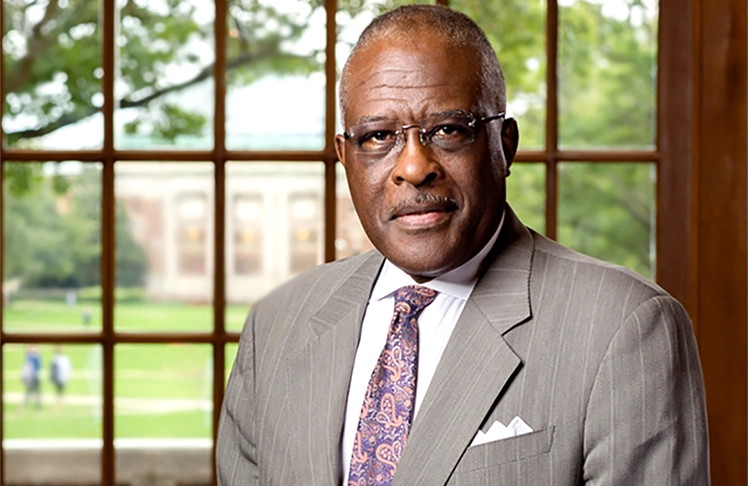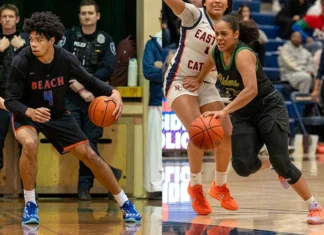
By Aaron Allen, The Seattle Medium
In his inaugural address as the newly appointed president of the University of Washington, Dr. Robert J. Jones delivered a powerful and forward-looking message about the future of higher education, the urgency of affordability, and the need for transformational collaboration across sectors.
Jones, a nationally recognized higher education leader, spoke candidly about the challenges universities face, including student debt, the changing demands of the workforce, and the need to expand access and equity. Central to his message was a call to redefine the University of Washington as a global leader not just in research and innovation, but in public purpose and impact.
“As president, I want to elevate these opportunities and prioritize what we need to achieve them in the face of serious challenges. And they are very serious challenges,” Jones said. “But we must resist the urge to just react or stand still. We must define what the University of Washington will be in a world that needs us now more than ever.”
Jones was born in Dawson, Georgia, a farming town of about 5,000 in the state’s southwest region. His parents were sharecroppers. As a Black child growing up in the Jim Crow South, he said higher education was not a given. It was a vision born of hope.
“Colleges didn’t mail brochures to my house or send recruiters to my high school. Neither of my parents had a high school diploma, but they wanted more for me and my siblings, and they recognized that education was the key,” Jones said. “There were no scholarships for students of color.”
His personal experience with educational barriers fuels a mission rooted in equity, access, and institutional accountability.
Jones spoke to the deep and lasting impact that educational debt has on students, particularly those from historically marginalized backgrounds.
“Too often, students, particularly those from low-income backgrounds, first-generation families, and communities of color, face a stark choice: take on crushing debt or forego their dreams,” Jones said. “The prospect of enormous educational debt keeps too many from even applying for college. This leaves talented young people on the sidelines, and it limits their economic opportunity.”
He made clear that higher education must do more than stand idle in the face of rising tuition and student debt. One of his signature goals is to make a UW education debt-free for all Washington undergraduates.
“It begins with students, and a bold mission: to make a University of Washington education debt-free for all Washington undergraduate students who decide to pursue a UW degree,” said Jones. “Notice that I said ‘debt-free,’ not ‘free.’ My parents instilled in me the belief that if something is free, it probably isn’t worth very much. And what the University of Washington offers to its students has tremendous value.”
“But an excellent, debt-free education is not only consistent with the founding principles of this public university, it serves the broader needs of society.”
Currently, 71% of UW undergraduates graduate with no known debt, thanks in part to the university’s Husky Promise program. That initiative aims to eliminate financial barriers and includes:
• Coverage of tuition and fees for eligible students from low- to moderate-income families
• Support to complete degrees in a timely manner
• Access to academic advising and career services
• Opportunities for leadership, community engagement, and professional development
• A focus on reducing student debt and increasing financial stability
“I challenge us to close the gap. We have the philanthropic spirit, the sense of mission, and the expertise to make it happen,” Jones said. “Debt-free college is not just an economic policy. It’s a moral imperative.”
While student debt and access remain top priorities, Jones also laid out a broad vision for deepening the university’s role in research, innovation, and real-world problem-solving. He described the future of higher education as requiring “radical collaborations” across disciplines and sectors.
“The University of Washington has long been a leader in cutting-edge research and innovation. But the next era requires more,” Jones said. “It will require us to move beyond multidisciplinary work. We must develop unconventional models that mobilize every kind of stakeholder.”
He called for investments in what he described as collaborative infrastructure. These are not just physical spaces, but systems and partnerships that incentivize creativity and drive meaningful results. These relationships, he said, must span government, philanthropy, industry, other universities, and community leadership.
“We want to invest in collaborative infrastructure, incentivize innovative partnerships, and deepen alliances with other universities, industry, government, philanthropists, and community leaders,” Jones said. “Because our mission is not just to discover, but to convert discovery into impact: healthier people, stronger communities, a more skilled and employable workforce, and greater prosperity for our region and the nation.”
He identified climate change, clean energy, advanced technology, and human health as areas where the university must not only lead, but serve as a model for the country.
Jones also called for the university to fundamentally rethink how it engages with the public, stressing the need for mutuality, transparency, and shared purpose.
“To truly honor our public promise, we must be of and for the public in every way,” he said. “That means deep, reciprocal community engagement, not outreach to communities, but partnership with communities. It means showing up, listening first, sharing knowledge, and being accountable. It means hearing our critics and responding in good faith to what they have to tell us.”
According to university data, only 20% of Washingtonians believe the UW prioritizes affordability, and just 50% believe it prioritizes career preparation. Jones acknowledged that disconnect and said the university must earn the public’s trust.
“We must take action to demonstrate that we share the priorities of the public we serve.”
He concluded his address by emphasizing that universities remain one of the greatest engines of upward mobility, even amid economic uncertainty and political division. But realizing that potential, he said, will require bold decisions, strategic planning, and shared sacrifice.
“I want to keep this work moving and build on it as we engage in a strategic planning process in the months ahead,” Jones said. “In short, we face real hurdles, and yes, hard choices. But our mission and our community will persevere. We will face those hurdles head-on with transparency, strategic discipline, and a collective commitment to innovation. Because with these challenges come opportunities.”



